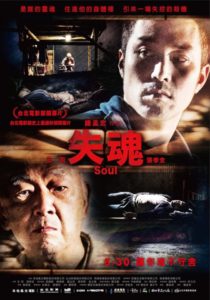Soul
失魂
Taiwan, 2013, colour, 2.35:1, 111 mins.
Director: Zhong Menghong 钟孟宏.
Rating: 5/10.
Arty backwoods slasher movie doesn’t give the audience much to hang on to.
Taibei, the present day. Chuan (Zhang Xiaoquan), 30, a cook in a small Japanese restaurant, suddenly passes out at work and is diagnosed with possible depression. His elder sister, Xiaoyun (Chen Xiangqi), and two workmates drive him to the ramshackle home of his widowed father, Old Wang (Wang Yu), deep in the hills near Taizhong, central Taiwan, where he grows orchids. The two workmates leave for Taizhong, and Xiaoyun stays on for a while. Inexplicably, the mute Chuan kills Xiaoyun, telling his father that “she was trying to hurt me”. He adds that he is not Chuan, that Chuan has already gone home. Xiaowu (Liang Hequn), a local policeman and old classmate of Chuan, drops by, wanting to talk. After he’s left, Old Wang buries Xiaoyun’s body in the forest and locks Chuan in an outhouse. When Xiaoyun’s husband (Dai Liren) arrives, trying to find out why she hasn’t returned home, Old Wang ends up killing him and burying him and his car in the hillside. Old Wang releases Chuan from the outhouse and lets him wander around in the forest, where Chuan meets an old man with a bamboo basket (Jin Shijie) and discovers a hidden well. Then Yang (Tuo Zonghua), Xiaowu’s superior, arrives and starts questioning Old Wang intently about the missing people.
REVIEW
A kind of arty backwoods slasher movie, set in the misty hills of central Taiwan, Soul 失魂 is the weakest of the three features to date by writer-director Zhong Menghong 钟孟宏, all of which reprocess genre elements in more or less interesting ways. Zhong’s striking debut, Parking 停车 (2008), set in the world of gangsters and hookers through one long night, was elevated by its black humour; The Fourth Portrait 第四张画 (2010), a kind of bleak ghost story between a boy and an old school caretaker, was much less precisely crafted. Soul goes another step back in elusiveness, following a 30-year-old cook who has some kind of mental breakdown, goes to stay with his aged father in the remote countryside, and becomes involved in a killing spree with no end in sight.
There’s nothing wrong with an arty slasher movie, but Zhong has ditched any psychology or developing tension for the viewer to hang on to as the narrative slowly unspools. Quite apart from the central character – played by Zhang Xiaoquan 张孝全 [Joseph Chang] (Gf*Bf 女朋友 男朋友, 2012; The Stolen Years 被偷走的那五年, 2013) with a blank face and little dialogue – being a total enigma for much of the running, the first killing, which sets the whole plot in motion, seems barely motivated, and for a film that positions itself as a psychodrama there’s not enough information or drama (and certainly no black humour) to drive a film of almost two hours in which blood-letting actually plays a very small part. The film vaguely recalls another arty slasher riff, the South Korean Bedevilled 김복남 살인사건의 전말 (2010), but, for all its faults, that film had more character motivation and sense of drama.
Actor-director Dai Liren 戴立忍 [Leon Dai] pops up as the brother-in-law of Zhang’s character and briefly gives the film some spine; a much later scene of a colourful policeman (cleverly played by Tuo Zonghua 庹宗华) who comes by asking some loaded questions generates a genuine tension; and for Taiwan movie buffs, director Chen Yuxun 陈玉勋 (Tropical Fish 热带鱼, 1995; Zone Pro Site 总铺师, 2013) is in a couple of scenes as a dour doctor. But Soul would be much less than it even is without the casting of 70-year-old action veteran Wang Yu 王羽 [Jimmy Wang] – now enjoying an Indian Summer in his long career, with juicy roles in Wu Xia 武侠 (2011) and The Guillotines 血滴子 (2012) – as the orchid-growing father who’s quietly loonier than anyone else on screen. With hardly a change in facial expression, Wang summons up a whole range of emotions (sadness, paternal love, madness) that sustains interest when the film is basically just ticking over.
The other star of the movie is the photography by director Zhong himself – under his usual Japanese alias Nakashima Nagao 中岛长雄 (The Fourth Portrait) – whose widescreen photography of the mist-wreathed hills, dark woods and naked light bulbs creates a fine stage for the film that Soul could have been with a less elusive script. Zhong’s regular editor, Luo Shijing 罗时璟, does a neat job with the material at hand. The Chinese title is more descriptive than the English one, meaning both “Lost Soul(s)” and “Out of One’s Wits”.
CREDITS
Presented by 3 NG Film (TW), Taipei Post (TW), Arrow Film Production (TW). Produced by Cream Film Production (TW).
Script: Zhong Menghong. Photography: Nakashima Nagao [Zhong Menghong]. Editing: Luo Shijing. Music: Zeng Siming. Art direction: Zhao Sihao. Styling: Xu Liwen. Sound: Du Duzhi, Guo Liqi.
Cast: Wang Yu [Jimmy Wang] (Old Wang), Zhang Xiaoquan [Joseph Chang] (Chuan, Old Wang’s son), Liang Hequn (Xiaowu, policeman), Chen Xiangqi (Xiaoyun, Chuan’s elder sister), Tuo Zonghua (Yang, police constable), Dai Liren [Leon Dai] (Xiaoyun’s husband), Jin Shijie (old man with bamboo basket), Chen Yuxun (Wu, doctor), Huang Jianwei, Na Dou [Lin Youzhi] (Chuan’s workmates), Wu Pengfeng (police constable), Wen Biqian (emergency-room doctor), Zhang Shihui (Chuan’s workmate), Zeng Boren (sanitarium worker), Wen Xsia (singer).
Premiere: Taipei Film Festival (Co-Opening Film; Taipei Film Awards: Narrative Features), 28 Jun 2013.
Release: Taiwan, 30 Aug 2013.
(Review originally published on Film Business Asia, 24 Sep 2013.)
